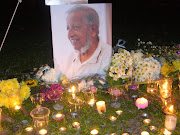The Singapore Democrats' article on the
Political and Economic Risk Consultancy or
PERC got me referring to a book I read titled
Singapore Miracle - Myth and Reality. This is from chapter 26, pg. 378,
The 2003 recession strikingly revealed the Government's readiness to sacrifice workers' interests rather than government reserves to meet MNC demands. The Government decided that workers' wages must not only be held down but actually cut to prevent Singapore becoming “uncompetitive” for foreign capital. Employers' CPF contributions for their employees were reduced from 16 per cent to 13 percent. The Government justified this by claiming that wages (which include employers' CPF payments) made up 40 per cent of business costs in Singapore. Wages were too high and had to be cut to retain the MNCs.
To support claims that Singapore workers were overpaid, misleading PERC statistics were cited by PAP minister Tony Tan. Normally one of the more reasonable PAP ministers, Tan quoted a PERC global study which claimed Singapore workers were more expensive than those in the US and Australia as well as in eight other developing countries surveyed. On a zero to ten labour cost scale, Singapore was ranked 5.5 compared to 5.07 for the US and 4.8 for Australia, claimed PERC. This was an “alarming” situation, blustered Tan:
To me this is a profoundly important statistic. It's a simple one but it gets to the nub of the problem. We have priced our labour out of the market.
Excessive wages rather than such “transitory factors” as the SARS crisis had caused the increased retrenchments in Singapore. PERC had crystallised the problem, he claimed. It was a structural one: high wages costs. Cutting wages would keep companies viable and save jobs. “We have no choice but to reduce our CPF rates substantially and quickly if we want to save our jobs,” Tan lectured. And this came from a cabinet minister on about S$800,000 a year. He was echoing similar calls made by Prime Minister Goh and Deputy Prime Minister Lee Hsien Loong. Hypocritical posturing aside, their claims were based on dubious PERC statistics and questionable assumptions that CPF cuts would save jobs.
A mountain of evidence refutes PERC's absurd assertions that Singaporean workers are better paid than those in the US and Australia. Even such pro-Singapore bodies as the IMD and WEF have demonstrated that pay rates for Singapore's manufacturing workers lag well behind those of other industrialised countries. For example, the basic adult wage in Australia is about S$2500 a month for unskilled workers. In Singapore, factory production workers are paid about S$800 to S$1000 a month, while wages can be as low as $S600 a month for cleaners and road sweepers.
There's much more in this very interesting book. Do get it. This is the article from the Singapore Democrats,
What is PERC?
The Political and Economic Risk Consultancy or PERC, as it is commonly referred to, is held in high praise by Singapore's establishment.
Mr Lee Kuan Yew himself placed the organisation in the same esteemed group with global institutions like the International Bar Association (IBA). That is, until IBA criticised the Judiciary, which then made it a Western liberal NGO out to do this island in.
The Minister Mentor is not the only one, Ministers Mentee also cite the company whenever they get the chance.
The Straits Times regularly carries prominent reports written by it.
"Non-government" think-tanks like the Singapore Institute of International Affairs cannot resist citing it
Even our Supreme Court proudly refers to it.
So who or what is this group that is so admired by Singapore's establishment? Who runs this outfit and what does it do?
PERC's website tells us that it is a "consulting firm specializing in strategic business information and analysis for companies" doing business in East and Southeast Asia. It also produces a range of risk reports on the strengths and weaknesses of individual countries in the region. So far so solid.
But when it comes to information about who runs the organisation, the website is rather diffident. For example under "Senior Management", there is only one name -- a Robert Broadfoot who is described as an economics graduate “directly responsible for managing PERC's research and consulting.”
Is there a governing board? If yes, who is on it? If no, is PERC a sole-proprietorship? Does anyone else run the organisation with Mr Broadfoot?
Based in Hong Kong, PERC says it “coordinates a team of researchers and analysts” but doesn't tell us who they are, how many there are, and what their areas of expertise are. Do they work full-time for the Consultancy or on an ad hoc project basis? If part-time, what are their main occupations and what companies do they work for?
The organisation also avers its "complete independence from any vested interest groups." Several lines below, however, it says that it engages in "retainer work and specific projects" and "in-house briefings" for international business associations. Who these groups and associations are is not revealed.
Such information is important as it allows the reader a gauge of just how independent the organisation is and, by extension, how reliable its reports are. This is especially salient when the reports are cited by governments for political purposes. Simply asserting that the company is completely independent does not make it so.
For example one of its analysts, Mr Bruce Gale, is also a senior writer with the Straits Times. Whether he continues to work for PERC is unclear as the website has no information on him.
Given the nature of the state-media arrangement in Singapore, it is more than fair to ask what an employee of an organisation that is supposed to have "complete independence" is doing writing for a newspaper owned and run by a government. It is imperative that PERC makes clear the status of Mr Gale.
Ironically, Mr Gale himself notes that "most political risk assessment remains both superficial and subjective. Typically, such analysis is very informal, consisting of little more than a few brief visits to the country..."
Even the information about the surveys that PERC conducts such as the kinds of questions asked, the variables used, the sample characteristics, etc are not readily available. One assumes that they are contained in the reports which cost US$645 to subscribe annually. Analysis of the reliability and validity of such surveys is lacking. This is a problem. Yet, the results are held next to biblical truth by those who benefit from it.
The next and obvious question is: Who pays for PERC's services? One will not be surprised to find Singapore's establishment a ready customer. For example, the Nanyang Technological University and the National Institute of Education are online subscribers to the organisation's Monthly Risk reports.
And what do these reports contain? The page tells us that the topics covered are "Politics, Economics, Business." Politics? The Singapore Democrats can confirm that PERC has never attempted to seek our views on matters political in Singapore. We're unsure if the Consultancy has interviewed any other opposition party or civil society group. We could easily find out by doing a search on its website. The only problem is the website doesn't have a Search button.
Given that the organisation is so oft-quoted by the Singapore establishment, it is time that more questions are asked of PERC which must do a better job of providing background information about itself. A consultancy that assesses the political and economic risk of countries must surely understand the importance of transparency.
This article was sent to PERC at info@asiarisk.com and it was invited to respond. If and when it does, we will publish it here.














2 comments:
Err does it matter if NTU and NIE subscribe to it? Especially the former.
Universities subscribe to lots of materials. Doesn't mean the materials are influenced by them.
Lol, Gabriel is right: the NTU/NIE quote is so deliciously and typically misleading.
Re: how NIE even got into the picture is quite amusing; I suspect the writer saw the portion which says "NIE Staff & Students (logon to NTU Libraries PCs)".
If anyone needs clarification, all it means is that NIE Staff and Students are required to "access [the] e-resources only within the premises of the NTU Library.... This is due to licensing agreements with vendors / publishers by which [the library has] to strictly abide by".
I'm a student at NIE so I tried logging in and got that message.
The bottom-line? Perhaps all political organisations, the SDP included, have a tendency to skew information to serve their own needs.
Post a Comment